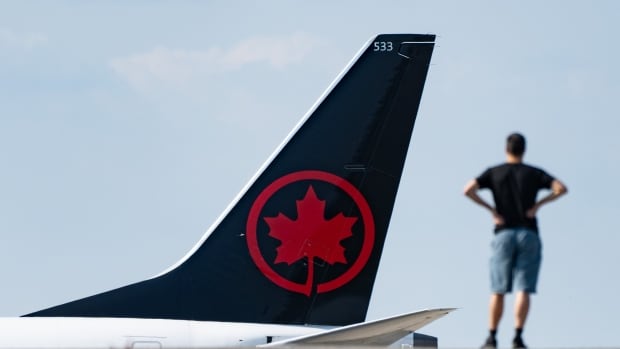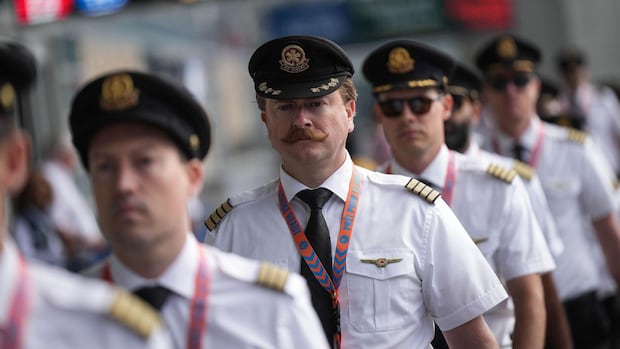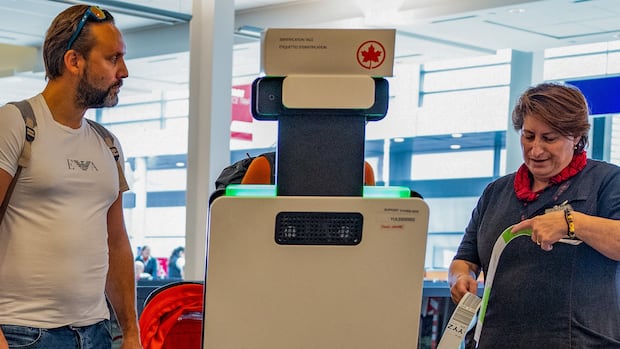
The countdown is on for Air Canada and its pilots to reach a deal, as both sides will be in a position to issue a 72-hour notice of a strike or lockout at 12:01 a.m. on Sunday.
The airline has said the notice would trigger its three-day wind-down plan and start the clock on a full work stoppage. That means a stoppage could start as soon as Wednesday.
In the days leading up to the deadline, both the company and the Air Line Pilots Association (ALPA), which represents 5,200 Air Canada pilots, have said they remain far apart on the central question of pay.
“Air Canada has been bargaining in good faith with ALPA for 15 months, meeting more than 100 times, and we remain engaged with the union to reach a new collective agreement,” the airline said in a statement on Saturday.
“Although our preparations for a possible suspension of operations continue, we have not yet cancelled any flights.”
CBC’s Linda Ward looks at what travellers can do if they’ve booked a flight with Air Canada ahead of a possible pilots’ strike.
Air Canada and its low-cost subsidiary, Air Canada Rouge, together operate nearly 670 flights per day. A shutdown would affect some 110,000 travellers a day, with some already making contingency plans.
Margaret Shapiro of Pender Island, B.C., told CBC News that due to the uncertainty surrounding a strike, she had “no option” but to book flights with a different airline as “an insurance policy.”
“It’s costing me $400 more than my original Air Canada tickets,” she said, adding her new Alaska Airlines flight has a layover in Seattle, whereas the original flight she booked was direct.
Shapiro’s Las Vegas trip is the latest biannual excursion with a group of six friends from university, now all in their 70s, who have known each other for decades. “We are seniors on fixed incomes, so it’s no small deal for us,” Shapiro said.
Airline and union ‘have to get serious’
The ongoing contract dispute is already having an impact on cargo. Air Canada has stopped accepting certain cargo items, such as live animals and perishables, which is affecting seafood exports from Atlantic Canada to Europe and the United States, said Duncan Dee, former chief operating officer at the airline.
“Both management and the union have to have to get serious about avoiding this strike at all costs, because the impact is severe,” he told CBC News Network. “The clock is ticking, and we need to proceed with some degree of certainty so that more Canadians aren’t inconvenienced.”
Dee said he expects Air Canada to start cancelling long-haul flights this weekend to ensure its planes are not overseas if a work stoppage begins.
Both Air Canada and its pilots will be in a position Sunday to issue a 72-hour notice of a strike or lockout unless a deal is reached, leaving travellers considering their options and hoping for the best.
Air Canada on Thursday called for the federal government to be ready to intervene and order both sides to binding arbitration. But Prime Minister Justin Trudeau on Friday said he wouldn’t tip the scales toward either party.
“I know every time there’s a strike, people say, ‘Oh, you’ll get the government to come in and fix it.’ We’re not going to do that,” Trudeau said at an event in Sainte-Anne-de-Bellevue, Que.
“We have and we will protect the Canadian economy. But first and foremost is putting all the pressure on the people who need to feel that pressure — unions and the employers.”
Prime Minister Justin Trudeau said he’s ‘not going to put my thumb on the scale’ on either side as Air Canada and the pilots’ union try to reach an agreement in an ongoing contract dispute.
The Air Canada negotiation deadline comes just months after WestJet mechanics went on strike for two days in July — a situation Dee called a “black eye” for the Canadian airline industry. A second strike, he said, would show the industry can’t be relied upon.
“There has to be a better way to manage these disputes,” Dee said. “Holding Canadian air travellers and Canadian shippers hostage is not the right way.”


